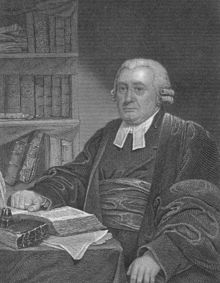Thomas Scott (commentator)
He is principally known for his widespread work A Commentary On The Whole Bible, for The Force of Truth, and as one of the founders of the Church Missionary Society.
[1] Thomas Scott was born in 1747 at Bratoft in Lincolnshire, the son of a grazier (cattle farmer), the 11th of 13 children.
He returned to the family farm in disgrace and he was reduced to working as a labourer for his father, enduring this for ten years before finally leaving home in 1772 to become ordained as an Anglican priest[2] at the age of 25.
During that period, Scott began a friendship and correspondence with the hymn writer John Newton, who was curate of neighbouring Olney.
This instigated an examination of his conscience and study of the Holy Scriptures that would convert him into an evangelical Christian, as related in his spiritual autobiography The Force of Truth published in 1779.
He would walk 14 miles every Sunday, preaching and taking services at various churches, including St. Mildred, Bread Street, and St. Margaret, Lothbury, in addition to his work at the hospital chapel.
[1] Scott's Commentary On The Whole Bible originally appeared in 174 weekly numbers starting in January 1788, and went into multiple editions.
He successfully persuaded relatives to buy up unsold copies of his works at a reduced price to clear the debt.
He also wrote that Scott's works "show him to be a true Englishman, and I deeply felt his influence; and for years I used almost as proverbs what I considered to be the scope and issue of his doctrine, 'Holiness before peace,' and 'Growth is the only evidence of life.
Frances was pregnant at the time of his death, and their son Benjamin John Scott was born later the same year, being baptised on 4 December 1830 in their home town of Bidford-on-Avon.
